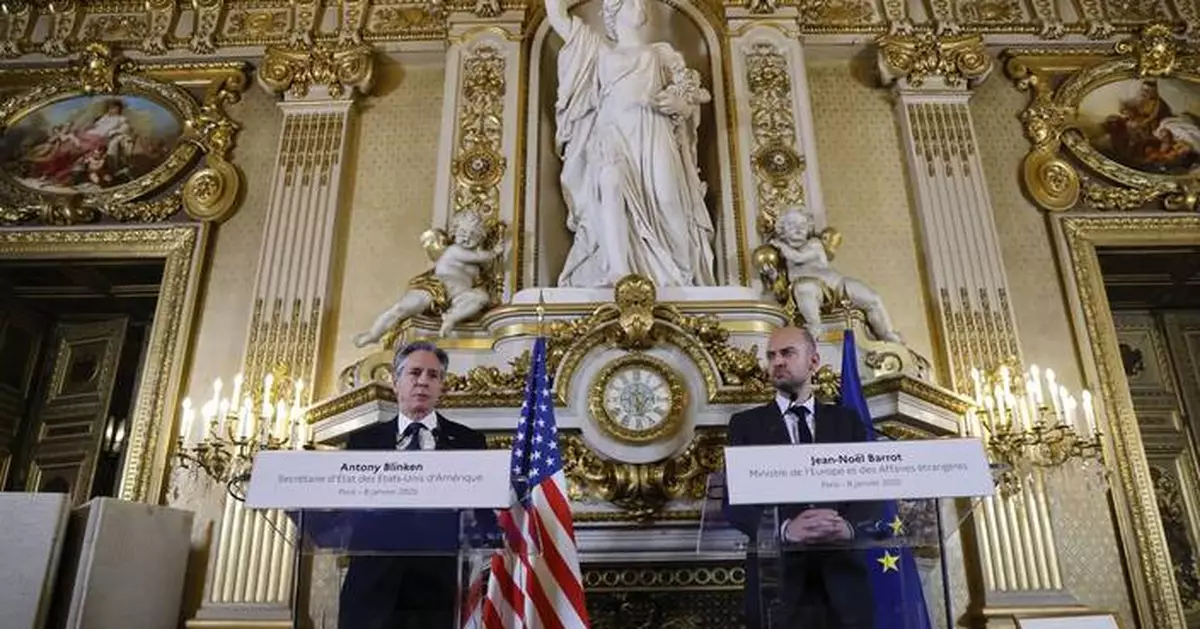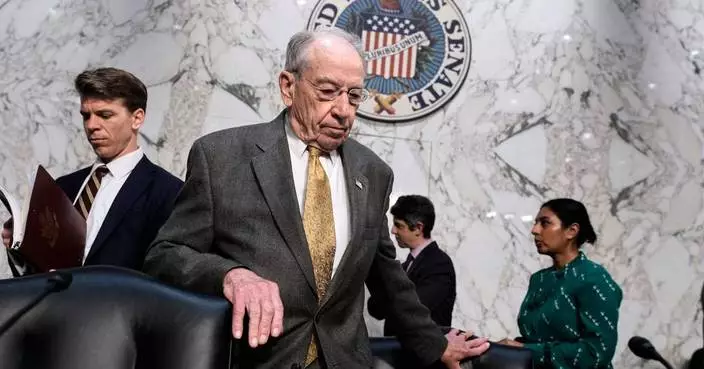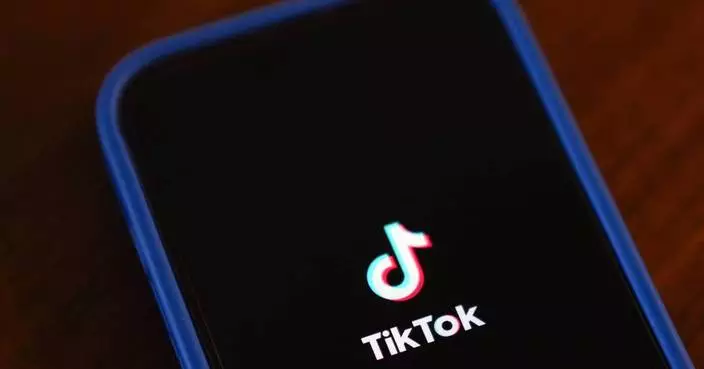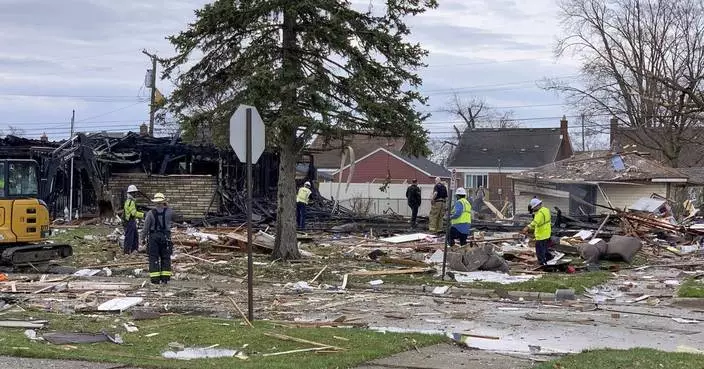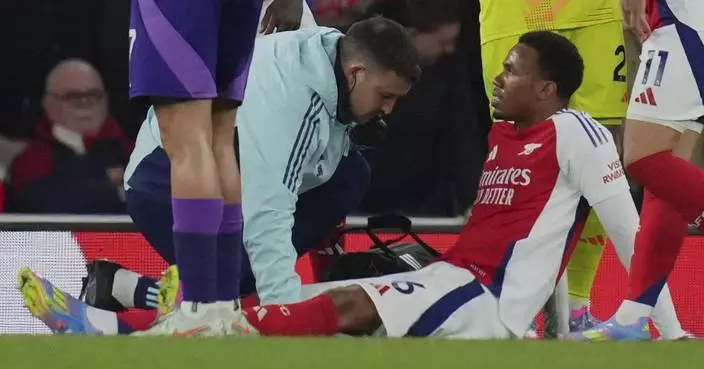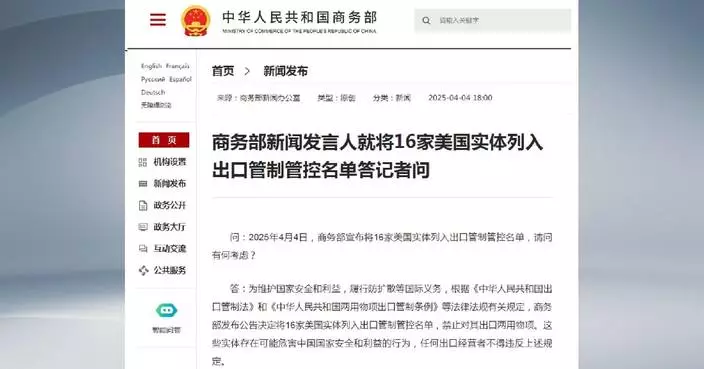PARIS (AP) — Outgoing U.S. Secretary of State Antony Blinken is advising the world “not to waste a lot of time” on what President-elect Donald Trump has been saying about Greenland.
Trump made clear again this week that he’d like the semiautonomous territory of Denmark to come under U.S. control and said he would not rule out the use of military force to make that happen.
“We need Greenland for national security purposes,” Trump said.
But Blinken said Wednesday that the incoming president's ambitions are unlikely to amount to anything more than talk.
“The idea expressed about Greenland is obviously not a good one,” the senior U.S. diplomat said during a stop in Paris for meetings.
“Maybe more important, it's obviously one that's not going to happen. So we probably shouldn't waste a lot of time talking about it," he said.
France’s foreign minister, Jean-Noël Barrot, also played down any possibility of U.S. forces being deployed against Denmark, a U.S. ally in the NATO military alliance.
But Barrot warned nevertheless that Europe must brace for turbulence ahead – as other powers throw their weight around.
“Do we think the United States will invade Greenland? The answer is, ‘No,’” the French minister said. “But do we think that we’re entering into a period that sees the return of the law of the strongest, the answer is, ‘Yes.’”
Europe must become stronger militarily and more economically and commercially competitive in response, Barrot said.
“We have to go a lot further to affirm who we are, what we want,” he said.
The Danish Prime Minister, Mette Frederiksen, has said she does not believe the United States will use military or economic power to secure control over Greenland and has appealed for U.S. behavior “that is respectful of the Greenlandic people.”
In Germany, Chancellor Olaf Scholz said Wednesday that the principle of inviolability of borders applies to every country no matter how powerful, in a reaction to Trump's remarks that did not mention the president-elect by name. “Borders must not be moved by force,” Scholz said.
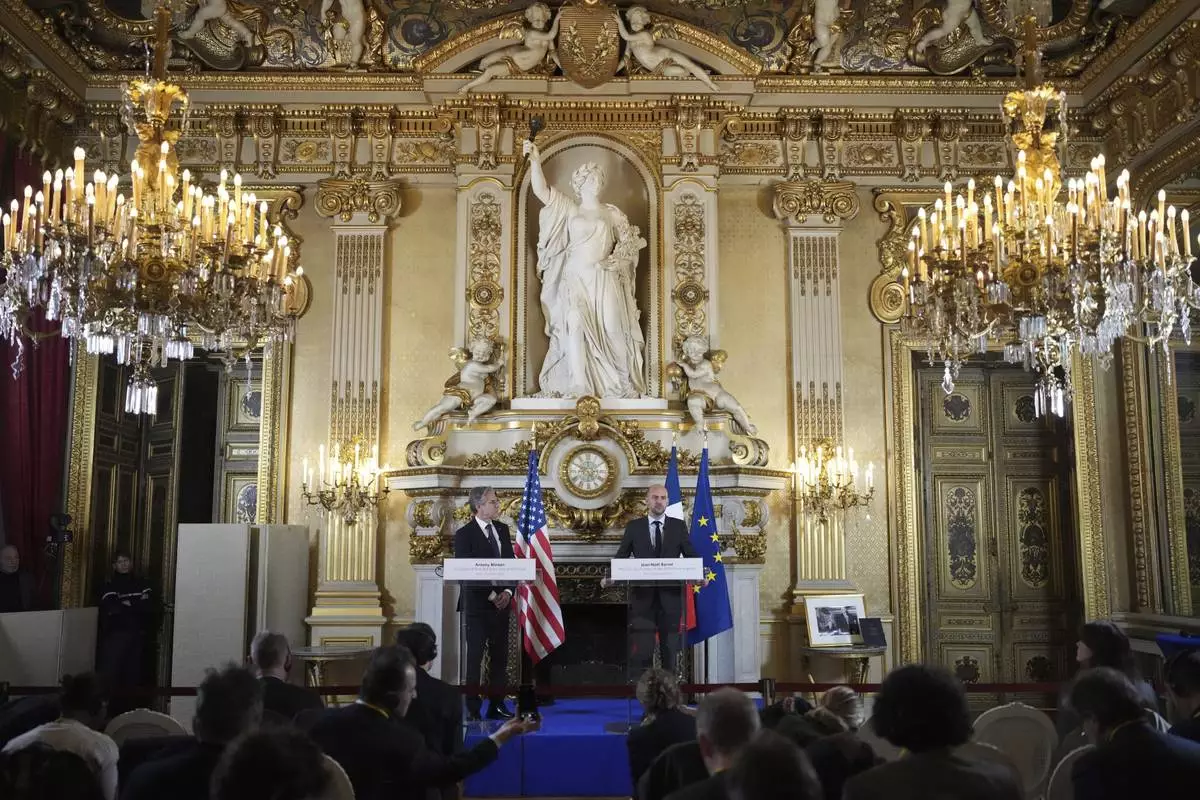
French Foreign Minister Jean-Noel Barrot, right, and U.S. Secretary of State Antony Blinken hold a press conference after their meeting, Wednesday, Jan. 8, 2025 in Paris. (AP Photo/Thibault Camus, Pool)
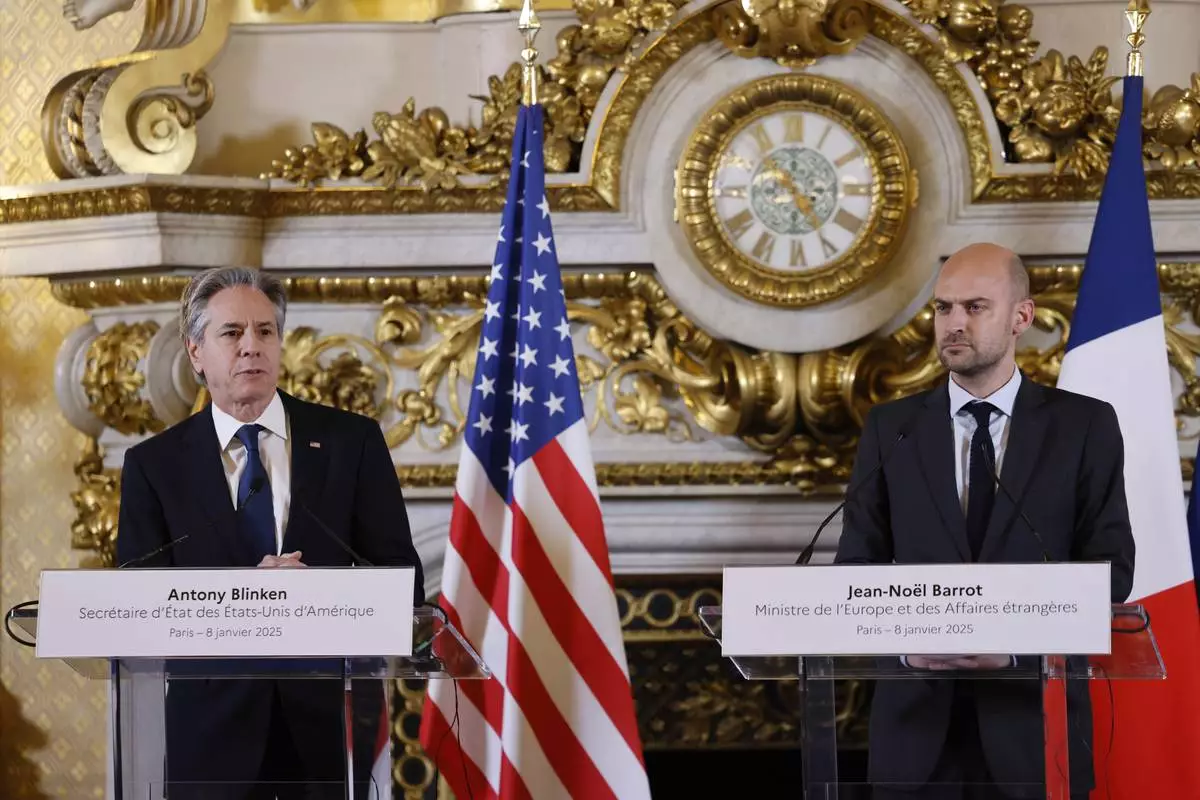
US Secretary of State Antony Blinken, left, and French Minister for Europe and Foreign Affairs Jean-Noel Barrot, right, attend a joint press conference after their meeting at the Quai d'Orsay in Paris, France, Wednesday, Jan. 8, 2025. (Ludovic Marin/Pool Photo via AP)
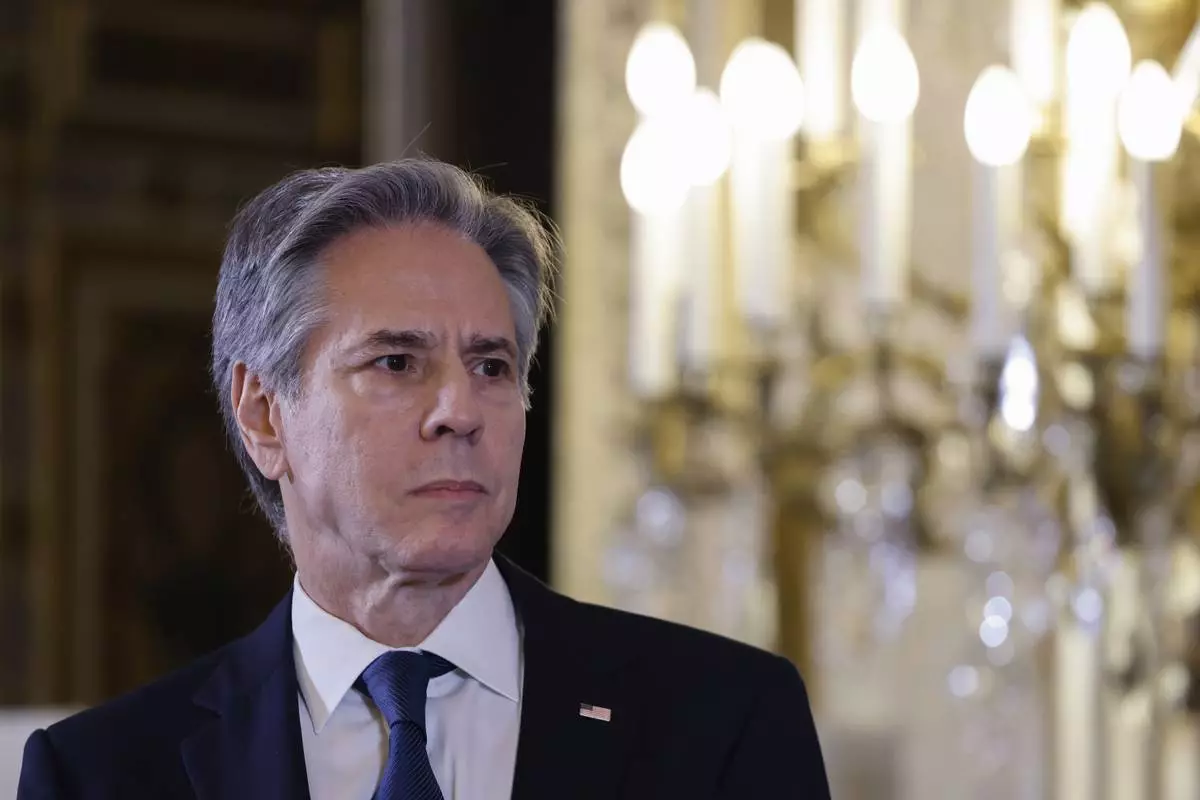
US Secretary of State Antony Blinken attends a joint press conference with French Minister for Europe and Foreign Affairs Jean-Noel Barrot after their meeting at the Quai d'Orsay in Paris, France, Wednesday, Jan. 8, 2025. (Ludovic Marin/Pool Photo via AP)
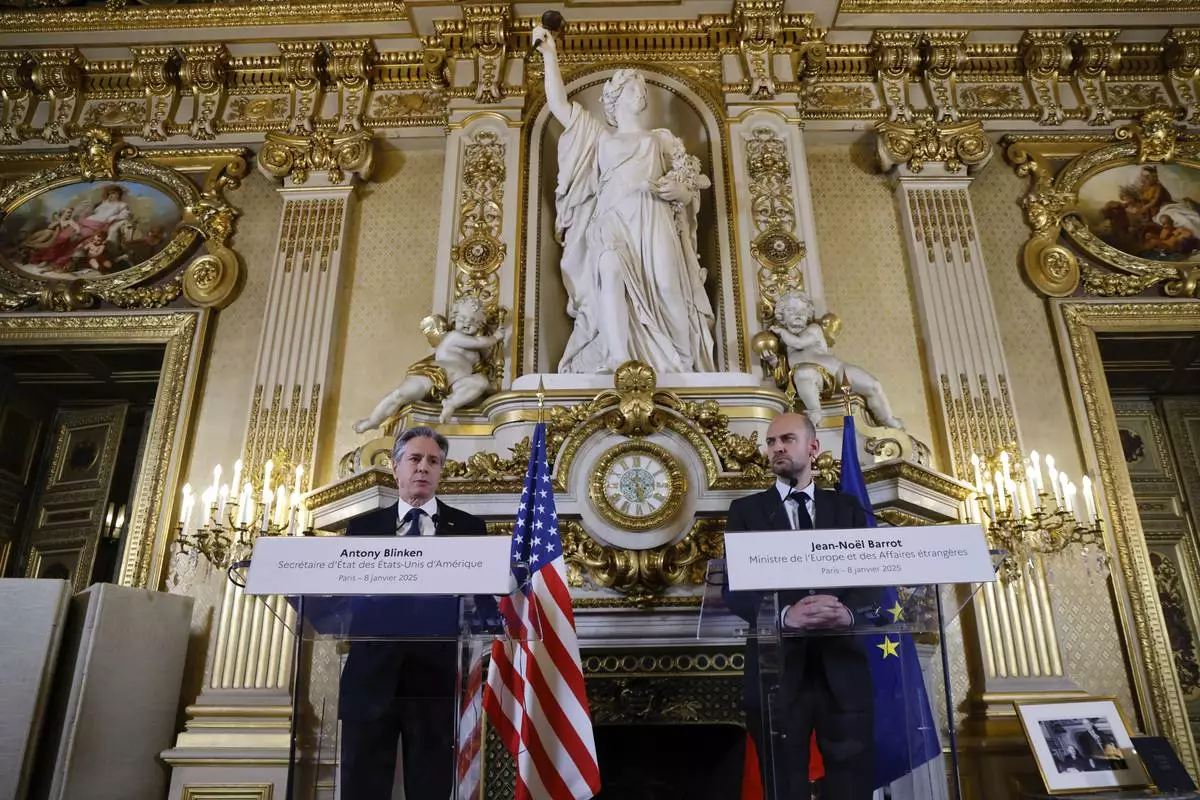
US Secretary of State Antony Blinken, left, addresses the media during a joint press conference with French Minister for Europe and Foreign Affairs Jean-Noel Barrot, right, after their meeting at the Quai d'Orsay in Paris, France, Wednesday, Jan. 8, 2025. (Ludovic Marin/Pool Photo via AP)
WEST PALM BEACH, Fla. (AP) — Two days after sending the economy reeling by announcing widespread tariffs, President Donald Trump insisted his trade policies will never change as he remained ensconced in a bubble of wealth and power in Florida.
He woke up on Friday morning at Mar-a-Lago, his private club in Palm Beach, and headed to his nearby golf course a few miles away after writing on social media that “THIS IS A GREAT TIME TO GET RICH."
Several supporters stood on the sidewalk as Trump, wearing his signature red “Make America Great Again” hat and white polo shirt, glided down a street lined with palm trees. They waved to him and he waved back, part of a ritual that plays out every weekend that he's in town.
The Republican president was not expected to appear publicly, although he's scheduled to attend a candlelit dinner for MAGA Inc., an allied political organization, on Friday evening. He spent Thursday in Miami at a different one of his golf courses, where he attended a Saudi-funded tournament. He landed in Marine One and was picked up in a golf cart driven by his son Eric.
Trump has often proved impervious to the kind of scandals or gaffes that would damage another politician, but his decision to spend the weekend at his gilded properties could test Americans' patience at a time when their retirement savings are evaporating along with the stock market. The tariffs are expected to increase prices by thousands of dollars per year and slow economic growth, and there are fears about a potential recession.
Democrats called out Trump for being in a “billionaire bubble," as Sen. Chuck Schumer put it, while millions watched their investments sink.
“While the American people are trying to put food on the table, I see that Donald Trump’s out there playing golf,” said Sen. Ben Ray Luján, a Democrat from New Mexico. “The president should be listening to people across the country. Maybe he should go into a grocery store, do some walking, talking to folks.”
Federal Reserve Chair Jerome Powell said Friday that the tariffs were “significantly larger than expected” and are “highly likely” to cause more inflation — at least in the short term but possibly in the long term as well.
However, Trump has described his policies as a painful yet necessary step to encourage companies to relocate their operations to the United States. Treasury Secretary Scott Bessent told Tucker Carlson in an interview released Friday that “I think we have to try this, and I have a high confidence ratio it’s going to work."
The president spent Friday morning defending himself on Truth Social, his social media platform, and vowing to stay the course.
“TO THE MANY INVESTORS COMING INTO THE UNITED STATES AND INVESTING MASSIVE AMOUNTS OF MONEY, MY POLICIES WILL NEVER CHANGE,” he wrote.
Although experts have harshly criticized the tariffs, he's found some support on TikTok. He shared a video that said “Trump is crashing the stock market” and “he’s doing it on purpose” as part of a “secret game he’s playing, and it could make you rich.”
The video featured a supposed quote from legendary investor Warren Buffett praising Trump, but Buffett's company issued a statement saying it was fabricated. The video also said that Trump's goal is to push the Federal Reserve to lower interest rates, something that the president explicitly called for later in the morning.
“This would be a PERFECT time" for Powell to cut interest rates, he wrote. “CUT INTEREST RATES, JEROME, AND STOP PLAYING POLITICS!”
With foreign leaders scrambling in response to Trump's announcement this week, the president lashed out and looked to cut deals.
He said he spoke with Vietnamese leader To Lam and claimed Vietnam wants to eliminate its tariffs on U.S. goods if it can make a deal with the U.S.
He also criticized China for announcing its own tariffs on U.S. imports.
“CHINA PLAYED IT WRONG, THEY PANICKED - THE ONE THING THEY CANNOT AFFORD TO DO!” he wrote.
Republicans suggested that Trump's policies would be the start of a parley with foreign countries.
“The president is a dealmaker if nothing else, and he’s going to continue to deal country by country with each of them,” said Sen. John Barrasso of Wyoming. He added that Treasury Secretary Scott Bessent had told Senate Republicans this week that the tariffs would be a “high level mark with the ultimate goal of getting them reduced” unless other countries retaliate.
Meanwhile, Trump also celebrated a new report showing the U.S. added 228,000 jobs in March, beating expectations. Although the numbers were a snapshot of the economy before the tariff announcement, Trump claimed vindication, saying they already show his moves are working.
“HANG TOUGH," he wrote. "WE CAN’T LOSE!!!”
Megerian and Groves reported from Washington.

President Donald Trump, driven by his son Eric Trump, arrives at Trump National Doral during the LIV Golf Miami tournament, Thursday, April 3, 2025, in Miami. (AP Photo/Alex Brandon)

President Donald Trump, driven by his son Eric Trump, arrives at Trump National Doral during the LIV Golf Miami tournament, Thursday, April 3, 2025, in Miami. (AP Photo/Alex Brandon)

President Donald Trump waves as he arrives at the Trump International Golf Club, Friday, April 4, 2025, in West Palm Beach, Fla. (AP Photo/Alex Brandon)

President Donald Trump, driven by his son Eric Trump, arrives at Trump National Doral during the LIV Golf Miami tournament, Thursday, April 3, 2025, in Miami. (AP Photo/Alex Brandon)

Flags brought by supporters wave in the breeze before President Donald Trump arrives at the Trump International Golf Club, Friday, April 4, 2025, in West Palm Beach, Fla. (AP Photo/Alex Brandon)

President Donald Trump waves as he arrives at the Trump International Golf Club, Friday, April 4, 2025, in West Palm Beach, Fla. (AP Photo/Alex Brandon)

President Donald Trump arrives at the Trump International Golf Club, Friday, April 4, 2025, in West Palm Beach, Fla. (AP Photo/Alex Brandon)






